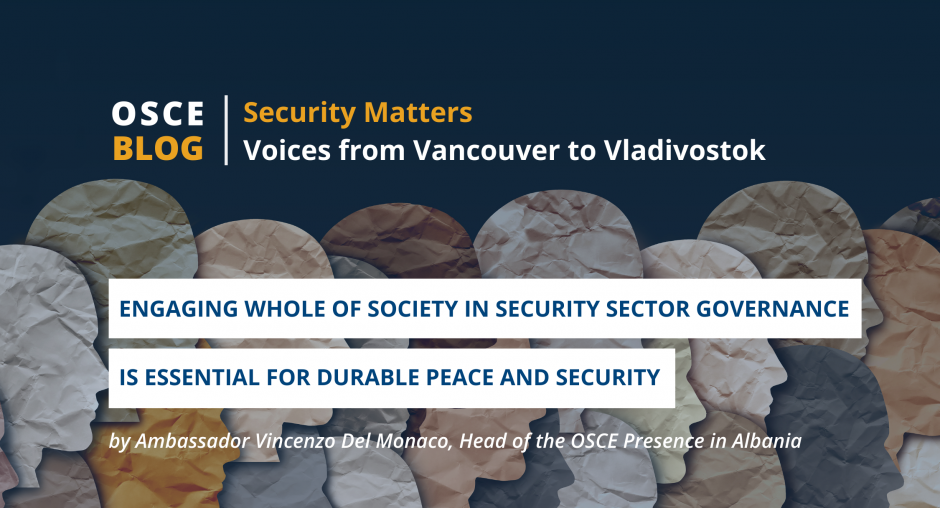Engaging whole of society in security sector governance is essential for durable peace and security

The governance of the security sector is central to the OSCE’s mandate, which I am honoured to serve in Albania. The topic might appear theoretical and obscure, and it may resonate as a subject to be debated only among experts, but the opposite is true! Governance of the security sector can only be durable and effective if a broad range civil society actors are actively involved.
In today’s world, freedom and pluralism cannot be secured only through the classic division of powers among the legislative, executive and judicial branches of government. Influential actors can be found at all levels – national, international and even sub-national. We have moved from a world of concentrated power to one much more diffused. This is why embracing a whole of society approach it essential to addressing security related issues.
A good illustration of the positive role that civil society plays in security in Albania is the establishment of a Consultative Group addressing environmental issues. Composed of 18 members from media and civil society organizations, this group provides expertise and guidance related to environmental violations to law enforcement agencies. Their contribution to the debate led to changes in the criminal code provisions on environmental violations, enhancing it with new provisions on waste crime, crimes against the natural environment, and trading of wildlife.
The work that our team in Albania does extends beyond engaging with the central authorities. I have travelled extensively throughout the country during the last two months, engaging with local institutions and actors to explore new paths for co-operation, and hearing from them how they prioritize and address safety and security issues. Throughout these travels I have emphasized the importance of the Local Safety Councils across the country, of which there are currently 54 but will soon expand to 61. These local councils, comprised of representatives from civil society, local administration, police, youth and women representatives are crucial for consolidating public safety at the local level.
Cross-generational engagement is essential in building trust in institutions and instilling a culture of transparency and accountability. We have regularly included young people in the equation of safety and security. By empowering them to be active on this topic, they can reduce the risk of violence and crime. In 2020, the OSCE Presence in Albania developed a comprehensive training package on youth safety and security. This package addressed conflict resolution, the role of youth in preventing violence, violent extremism, and domestic violence, youth engagement in decision-making, and youth partnership with security actors.
There is also a link to women, peace and security (WPS). We have partnered with other organisations such as UN Women and the Dutch Embassy, to help bring about the adoption of the first ever Women, Peace and Security Action Plan of Albania, implemented 2019–2020. The Presence’s engagement to support Albania’s National Action Plan on UNSCR Resolution 1325 has shown that civil society activists and associations are crucial in advancing this agenda. This is particularly true when it comes to the practical implementation – whether that’s measures related to access to justice, identification, victim protection, and rehabilitation, to addressing positive action to promote women in leadership positions in the country’s peace missions abroad, domestic law enforcement, and policy making on WPS. The Albanian Network on Women, Peace and Security has shown that involving civil society becomes more and more important when it comes to monitoring and holding state actors accountable.
The bottom line is that any order or system, to be truly effective, needs to be evaluated by what it manages to deliver concretely, and the ultimate measure of any reform effort is whether or not it generates benefits to citizens. When the majority of the population not only enjoys these benefits, but has been actively engaged and involved in bring them about, then we can remain confident that the climate is conducive to prosperity, stability and security.

